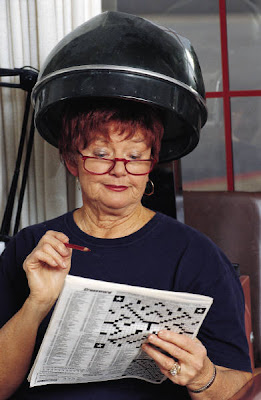
How many times have you overheard a complete stranger’s most personal details, loudly shared during a cell phone call? Or tried to watch a movie in a theater, only to be distracted by the flashing lights of text messages?
We’ve
shared before a handy guide on when and where you should turn off your cell phone. It’s a topic worth revisiting, especially since July is
National Cell Phone Courtesy Month!
 Jacqueline Whitmore, founder of National Cell Phone Courtesy Month
Jacqueline Whitmore, founder of National Cell Phone Courtesy MonthIn July 2002, etiquette expert
Jacqueline Whitmore saw a need for education on proper cell phone use. Then she realized no such awareness formally existed—so she formed National Cell Phone Courtesy Month herself.
Whitmore is the founder of the
Protocol School of Palm Beach and the author of
Business Class: Etiquette Essentials for Success at Work (St. Martin’s Press, 2005) and the upcoming
Poised for Success (St. Martin’s Press, November 2011). She has appeared on ABC’s 20/20, The Fox Report with Shepard Smith, CNN’s Anderson Cooper 360°, The Daily Show with Jon Stewart, ExtraTV, CNBC, and FoxBusiness.com.
So, as you might imagine, she was uniquely qualified to start an awareness campaign on cell phone etiquette.
Even though that was 9 years ago, Whitmore says she still sees plenty of bad cell phone manners, both in texting and calling, and it’s not just young people who are the offenders.
“The Millenials or Gen-Ys do more texting, but I think the Baby Boomers are catching up as much,” she said during a recent phone call. “Each generation violates their own set of cell phone etiquette rules.”
Common cell phone pet peeves include the “cell yell” (someone loudly sharing a private conversation or even argument while on the phone), calling or texting at movie theaters or concerts, and customers refusing to get off the phone while a sales clerk, bank teller or other service industry workers attempt to help them.
The phone itself isn’t a problem, she says: it’s how you use it.
“I don’t mind texting,” she said. “It’s only a problem when you do it in the company of other people, not paying attention to the person you’re with.”
These days, even young children have cell phones designed and marketed especially to them—not just toys meant to model mom’s or dad’s phone, but working cell phones. We asked Whitmore whether she thought such early exposure to technology would change the way children interact socially with others as they grow—would they, for example, be unable to look at someone in the face while talking to them, so used to communicating via texting?
Again, Whitmore suggested the phone is a tool, and it’s up to parents to teach their children how and when to use it.
“Children are receiving their messages of what’s right and wrong from their parents,” she said. “When they see their parents engaging in poor cell phone behavior, they think that’s the right way to act.”
So, parents: if you out to dinner, the movies, or anywhere else it’s inappropriate to use your phone, and you tell your children to put the phones away, that means you need to follow your own advice.
“You can’t have a double standard,” she said.
We are pleased to share with you Whitmore’s top 10 cell phone etiquette tips, used with permission from her
blog. For more information, visit her
website.1.
Be all there. When you’re in a meeting, performance, courtroom or other busy area, let calls go to voicemail to avoid a disruption. In some instances, it’s best to put your phone on silent mode.
2.
Keep it private. Be aware of your surroundings and avoid discussing private or confidential information in public. You never know who may be in hearing range.
3.
Keep your cool. Don’t display anger during a public call. Conversations that are likely to be emotional should be held where they will not embarrass or intrude on others.
4.
Learn to vibe. Use your wireless phone’s silent or vibration settings in public places such as business meetings, religious services, schools, restaurants, theaters or sporting events so that you don’t disrupt your surroundings.
5.
Avoid “cell yell.” Remember to use your regular conversational tone when speaking on your wireless phone. People tend to speak more loudly than normal and often don’t recognize how distracting they can be to others.
6.
Follow the rules. Some places, such as some restaurants or courtrooms, restrict or prohibit the use of mobile phones, so adhere to posted signs and instructions. Some jurisdictions may also restrict mobile phone use in public places.
7.
Excuse yourself. If you’re expecting a call that can’t be postponed, alert your companions ahead of time and excuse yourself when the call comes in; the people you’re with should take precedence over calls you want to make or receive.
8.
Send a text message when you want to send a quick message. But remember not to text while having a conversation with another person. It’s important to give others, especially clients and customers, your full, undivided attention.
9.
Watch and listen discreetly. Multimedia applications such as streaming video and music are great ways to stay informed and access the latest entertainment. Use earphones to avoid distracting others in public areas.
10.
Don’t text and drive. Don’t put your life or those of others at risk. Pull over if you absolutely must send a message or wait until you reach your destination.





















































